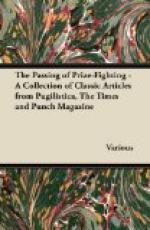* * * * *
Lately, volumes of individual memorial to dead youth seem to have become less frequent. Perhaps there was a suggestion that the making of them, or rather their publication for the eyes of strangers, was in danger of being overdone. However this may be, I think that, quite apart from the appeal of circumstance, there would always have been a welcome for such a bright-natured book as one that Father Ronald Knox has put together, mostly from diaries and letters, about Patrick Shaw-Stewart (Collins). Eton and Balliol will agree that there could be no biographer better fitted to record the life, as happy seemingly as it was fated to be short, of one who combined success with popularity at both these places, was caught by the War on the threshold of a wider career, served his country with very notable distinction and was killed in the winter of 1917. Though he met death in France, the most of Shaw-Stewart’s war-service was on the Eastern front; in particular he saw more than most soldiers of the whole Gallipoli adventure, to which he went as a member of that amazing company—surely the very flower of this country’s war contribution—the Hood Battalion of the R.N.V.R. Here he was the comrade of many of those whom England has especially delighted to honour: Rupert Brooke, Denis-Browne, Charles Lister and others, all of whom figure in these vivid and most attractive letters; from which also one gathers an engaging picture of Shaw-Stewart himself, a generously admiring, humorous and entirely independent young Tory in a band of brilliant revolutionaries. In fine a book (despite its theme of promise sacrificed) full of laughter and a singularly charming character-study of one who, in his biographer’s phrase, was assuredly “not one of the passengers of his generation.”
* * * * *
[Illustration: THE SPECIALIST.
Eminent Botanist on scientific expedition. “Dear me! Why didn’t I take up Zoology instead of Botany? This seems such an interesting specimen.”]
* * * * *
Miss Ella Sykes, after going with her brother and a camera on his special mission to Kashgar during the earlier days of the War, has detailed in charming fashion, under the title Through Deserts and Oases of Central Asia (Macmillan), their travels in lands still almost unknown. Sir Percy Sykes himself has added some chapters on the history and customs of the district in order to allow himself the pleasure of referring affectionately to his hunting of the giant sheep—the Ovis poli—of the Pamirs. Between them they have given me a good deal of information, with a lot of really capital photographs, about a country—Chinese Turkestan—that one may have just heard of before, though it is impossible to be sure. Resisting a burning desire to pass on newly-acquired learning to the first listener, I will be content to say that a more readable volume




